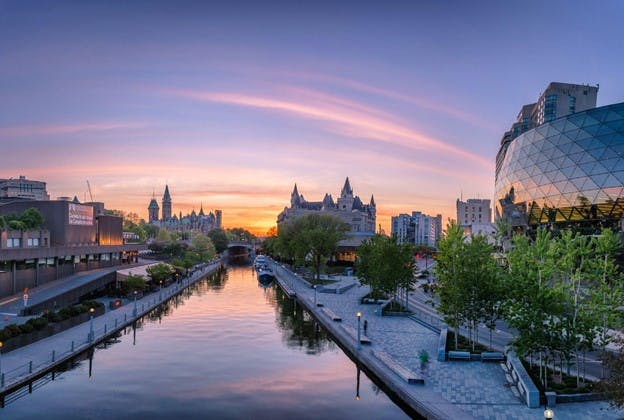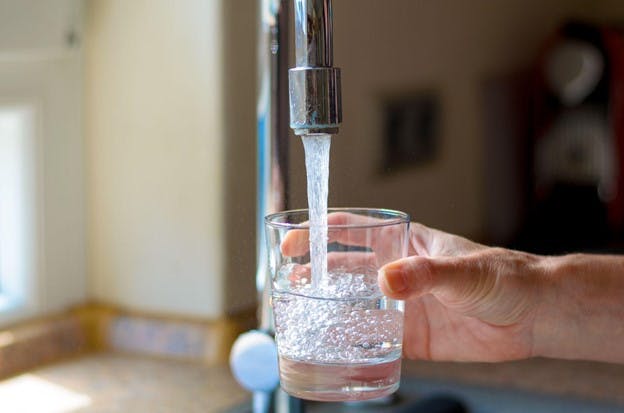March 2024
What Residents Need to Know About Ottawa Water Quality
Having access to safe drinking water provides many health benefits and contributes to a longer life. While Canada’s drinking water supplies are of “generally of excellent quality,” according to the Canadian government, they can still vary from city to city and pick up impurities along the way from the water source to your tap.
If you’re living in the city of Ottawa, Ontario, or thinking of moving there, then you may be wondering about Ottawa’s water quality and whether the tap water is safe to drink. Although Ottawa’s water system meets national standards, some residents may be more likely to experience hard water or contaminated water than others.
Here’s what you need to know about Ottawa water quality, and how you can test your tap water for common contaminants like lead and arsenic.
Is It Safe to Drink Tap Water in Ottawa?
The tap water in Ottawa, Canada, is generally considered safe to drink. According to the City of Ottawa, residents don’t need to filter or boil their tap water, and health authorities like Ottawa Public Health and the Medical Officer of Health work closely with the city’s Water Services to monitor the quality of Ottawa’s drinking water systems.
However, that doesn’t mean everyone’s water quality is the same. Residents who have a private well could be at higher risk of bacteria like E. coli, while those with lead pipes or service lines could have higher levels of lead in their drinking water.
Additionally, Ottawa’s water treatment process can introduce chemicals like chlorine and trihalomethanes (THMs), which some consumers may prefer to remove from their water to reduce their exposure to these chemicals and improve the taste.
Is Ottawa Water Hard or Soft?
Ottawa’s drinking water comes from multiple sources with different amounts of minerals like calcium and magnesium that contribute to water being hard or soft. According to the City of Ottawa, Ottawa’s central water supply, which comes from the Ottawa River, is “very soft,” with around 30 milligrams per liter of hardness.
Ottawa also has municipal wells that draw from groundwater resources. These range from moderate hardness (200 mg/L) to hard water (350 mg/L).
Although hard water isn’t unsafe to drink, it can affect the taste of the water, and it can leave mineral residue on pots, pans, kettles, and even on the hair and skin. Residents with hard drinking water may choose to install a water softener such as this Compact Cabinet Water Softener to improve the taste.
Is It Safe to Swim in the Ottawa River?
Ottawa’s abundant water resources aren’t just for drinking. The Ottawa River also has several freshwater beaches such Britannia Beach and Petrie Island Beach. Swimming in the Ottawa River is usually safe, but there are times when levels of bacteria in the water exceed provincial safety standards.
Ottawa Public Health collects water samples during the summer months (between June and August) and posts the test results online. If the geometric mean of the samples is higher than 200 E. coli per 100 mL, they’ll post a swim advisory the next day.
This often happens after heavy rain, when wastewater plants, sewer overflows, and septic systems discharge pathogens that can affect the beach water quality.
The Ottawa River is also unsafe to swim in when there are blue-green algae blooms in the Ottawa River rivershed, which produce toxins that can be harmful to people and pets.

Why Does Water Have to Be Treated in Ottawa?
Although Ottawa’s water sources are cleaner than the water in many parts of the world, it still needs to be treated to ensure consistent drinking water quality. According to the City of Ottawa, the Ottawa River has a “tea” color because it comes from a forested area where leaves and bark make their way into the water.
Ottawa River water may also contain sediments, algae, bacteria, and pathogens that are unsafe or undesirable to have in the drinking water.
The City of Ottawa has two treatment plants that process 275 million liters of water per day following a 10-step process that takes eight hours. These steps include:
- Coagulation and flocculation, or the use of chemical coagulants to cause large clumps of particles and stick together for easier removal
- Filtration and sedimentation, or the physical removal of sediments and other contaminants from the water
- Disinfection, or the addition of chlorine and other disinfectants to kill viruses and bacteria like chloroforms and E. coli
- pH correction, which adjusts the acidity or alkalinity of the water
Is There Fluoride in Ottawa’s Drinking Water?
Yes, but the concentration of fluoride varies depending on the source water. The City of Ottawa maintains a concentration of 0.70 mg/L in its central water supply, which is the amount recommended by Health Canada for optimal dental health.
Water from municipal wells has lower levels of fluoride, ranging from 0.05 mg/L to 0.65 mg/L. These levels occur naturally, and no additional fluoride is added.
Although adding fluoride to water has a long history, and this contraction is well below the American EPA’s safety guidelines of 4 milligrams per liter, some residents may prefer to get their fluoride from dental products rather than from their drinking water.
If you want to filter out chlorine and lead but keep the fluoride, choose a filter like the HomeWater EZChange Under-Counter 2-Stage Water Filter. To remove fluoride too, choose the 4-Stage Under-Counter Reverse Osmosis Water Filtration System.
Is There Lead in Ottawa’s Drinking Water?
Although Ottawa’s drinking water is lead-free when it leaves the treatment plant, it can pick up trace amounts of lead as it moves through old lead pipes and water mains.
According to the City of Ottawa, 85% of homes have concentrations lower than 1 part per billion (ppb), while homes with older pipes may have concentrations between 1-5 ppb, or even as high as 10 ppb — Ontario’s maximum allowable limit. Homes built before 1958 are more likely to have a lead water main.
To prevent lead pipes from dissolving into tap water, the City of Ottawa maintains pH levels of 9.2-9.4. They also perform regular water quality monitoring, and residents can call 3-1-1 to have their water tested for lead for free.

What Is the Source of Drinking Water in Ottawa?
Most of the drinking water in Ottawa comes from the Ottawa River, which originates in Quebec before connecting with the Gatineau River and flowing into the St. Lawrence River near Montreal. Although the water is treated, it can still have an “earthy” smell compared to other drinking water systems.
The City of Ottawa also maintains six groundwater well systems:
- Carp well system
- Kings Park (Richmond) well system
- Richmond West Well System
- Munster well system
- Shadow Ridge (Greely) well system
- Vars well system
These groundwater wells have a higher mineral content and lower fluoride levels than central water supply but meet the same drinking water standards.
Can You Drink from Private Wells in Ottawa?
Some Ottawa residents get their water from private wells. There are as many as 50,000 private wells in Ottawa, which aren’t maintained by the city and come with their own set of health considerations. Small businesses like hotels and restaurants are responsible for maintaining their own Small Drinking Water System if they have one.
Private wells can be contaminated with:
- Bacteria, viruses, and parasites
- Nitrates and nitrites from agricultural runoff
- High levels of sodium, chloride, or sulfates
The Ministry of Public Health will test your well water for bacteria for free, but you’ll need to use a licensed lab to test for other types of water quality testing.
How Frequently Is Water Quality Tested in Ottawa?
The City of Ottawa continuously monitors its water supply and performs over 100,000 tests every year. It also continues to research new technologies for water treatment.
You can view the annual Ottawa water quality report for each purification plant and well system. Ottawa Public Health will announce a public health advisory if there are any issues with the water supply and if precautionary measures should be taken.
If you have a private well, they recommend testing it for bacteria every spring, summer, and fall, or any time something looks or tastes off about your well water.
You may be able to disinfect a private well with a “shock treatment” using chlorinated bleach, or use a well water filter to remove minerals and other contaminants.
What If I Have Questions About Ottawa Water Quality?
The City of Ottawa maintains over 3,000 kilometers of water mains and delivers drinking water to nearly 1 million customers. It has 14 reservoirs and 32 pumping stations, and handles everything from water meter replacements to service line repairs.
To pay your water bill, manage your account, or set up, cancel, or transfer your service, visit your My ServiceOttawa account at Ottawa.ca. If you have questions about the bill, you can contact the Revenue Office at 613-580-2444 or revenue@ottawa.ca.
For general information, call 613-580-2424, ext. 22300. To report a problem or get help with issues like discolored water, call 3-1-1 and request a site visit.

Get the Best-Tasting Water at Home
According to the City of Ottawa and Ottawa Public Health, Ottawa’s water quality is high and is generally safe to drink, but some consumers may have specific health concerns or taste preferences. Using a water filter can remove minerals and contaminants like nitrates and trihalomethanes (THMs) and improve the taste of your water.
To find the right water filter for you, test your water so you know which contaminants of concern it contains. A reverse osmosis filter can help you remove heavy metals like lead and arsenic, while an activated carbon filter removes chemicals like chlorine and other byproducts of the disinfection process.
Consider the UPSTREAM 4-Stage Whole Home Water Filter to remove THMs, VOCs, pesticides, and even microplastics from the water coming out of your tap.